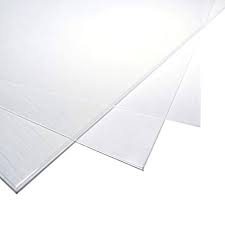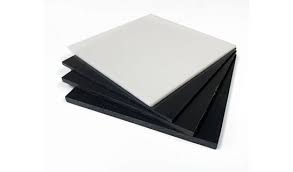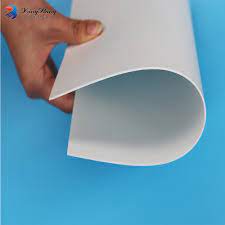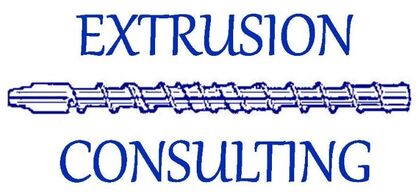Are you interested in plastic sheet extrusion consulting? Click the button below to get help now.
How is plastic sheet made?
A manufacturer uses an extruder which has a highly polished screw conveys and shears plastic pellets inside a barrel while heating, compressing and melting the polymer into a homogenous molten mass. At the end of the extruder, molten plastic is pushed out through a long, flat die. The flat plastic shape can be pulled along at its extruded size or stretched by grips into wider oriented sheets. Then the plastic material is fed into a series of round metal cooling cylinders, often the uneven edges are trimmed off and the product is often wound onto spools. Thicker sheets can also be cut and stacked flat for use in thermoforming into many different shapes by other companies.
How is plastic sheet different from a plastic film?
Plastic sheets are a continuous plastic material thicker than 0.25 mm that is generally wrapped on a core but also commonly sliced into sheets. Plastic film is anything thinner than that. Plastic material is fed to an extruder machine which delivers molten polymer to a flat die making a continuous sheet that can be very wide. The extrusion process also includes delivery of the molten material to a variety of rollers that assist in cooling the thermoplastic while keeping the sheet very flat and fully aligned. Sheet can be formed from a variety of materials including polyethylene of any density and both flexible and rigid PVC as well as PETG, polypropylene, polystyrene, and acrylics. The sheet can be clear, colored, smooth, rough, functionally embossed, opaque, or semi-transparent, depending on the demands of the application. Plastic sheets are used as signage, and clear acrylic and Plexiglas sheets make excellent windows, large picture frames, barriers and point of purchase displays.
How does Extrusion Consulting assist sheet manufacturing clients?
While the project list will continue to grow, we have assisted clients in several ways. The most popular projects in 2021 have been in specifying, sourcing and installing used equipment to expand capacity for existing manufacturers. We have also assisted with business plan development, resin selection, and toll manufacturing. If your business has a different need, then challenge us. We are always ready to take on new types of projects including bioplastics and biodegradable polymers.
A manufacturer uses an extruder which has a highly polished screw conveys and shears plastic pellets inside a barrel while heating, compressing and melting the polymer into a homogenous molten mass. At the end of the extruder, molten plastic is pushed out through a long, flat die. The flat plastic shape can be pulled along at its extruded size or stretched by grips into wider oriented sheets. Then the plastic material is fed into a series of round metal cooling cylinders, often the uneven edges are trimmed off and the product is often wound onto spools. Thicker sheets can also be cut and stacked flat for use in thermoforming into many different shapes by other companies.
How is plastic sheet different from a plastic film?
Plastic sheets are a continuous plastic material thicker than 0.25 mm that is generally wrapped on a core but also commonly sliced into sheets. Plastic film is anything thinner than that. Plastic material is fed to an extruder machine which delivers molten polymer to a flat die making a continuous sheet that can be very wide. The extrusion process also includes delivery of the molten material to a variety of rollers that assist in cooling the thermoplastic while keeping the sheet very flat and fully aligned. Sheet can be formed from a variety of materials including polyethylene of any density and both flexible and rigid PVC as well as PETG, polypropylene, polystyrene, and acrylics. The sheet can be clear, colored, smooth, rough, functionally embossed, opaque, or semi-transparent, depending on the demands of the application. Plastic sheets are used as signage, and clear acrylic and Plexiglas sheets make excellent windows, large picture frames, barriers and point of purchase displays.
How does Extrusion Consulting assist sheet manufacturing clients?
While the project list will continue to grow, we have assisted clients in several ways. The most popular projects in 2021 have been in specifying, sourcing and installing used equipment to expand capacity for existing manufacturers. We have also assisted with business plan development, resin selection, and toll manufacturing. If your business has a different need, then challenge us. We are always ready to take on new types of projects including bioplastics and biodegradable polymers.



